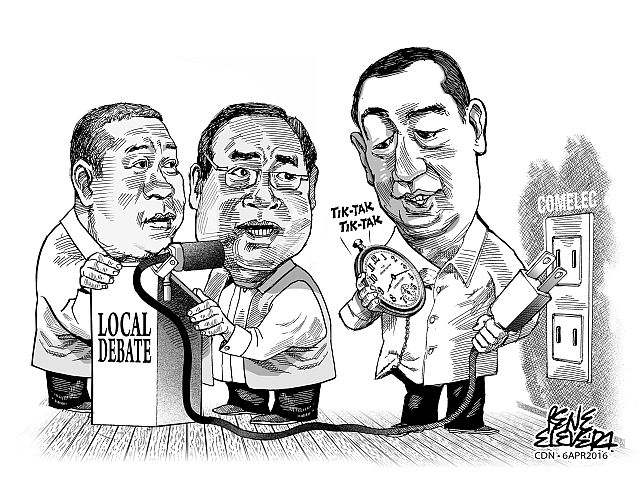
Thus we wouldn’t have to see the spectacle of former mayor Tomas Osmeña challenging erstwhile ally Cebu City Mayor Michael Rama to a debate every now and then only to be turned down repeatedly.
That same debate challenge had been thrown by One Cebu gubernatorial candidate Winston Garcia to Cebu Gov. Hilario Davide III who also ignored it, saying he had better things to do.
If we remember correctly, Comelec chairman Andres Bautista also called on local Comelec offices to sponsor debates among local candidates but nothing came out of it because this was’’t covered by an executive order.
Besides, the local Comelec offices had more than enough on their hands training teachers, their personnel and coordinating with the police and military in securing the election venues.
In fact, these offices have the backbreaking task of laying down the groundwork for the country’s elections with the Comelec central office overseeing all of them.
Adding an additional assignment to these understaffed offices is like driving yet another nail into their heads.
Which is why it is the private sector, mostly the local media, who are left to organize among themselves a debate that will feature all local candidates in assorted positions. If the national debates are a nightmare in terms of logistics and labor, it’s no less a challenge on the local level.
Problem is not every local candidate is as interested as seen in the cases of both Rama and Davide. For those who criticize Rama for backing down from Osmeña’s debate challenge, one of the mayor’s supporters said in the mayor’s Facebook account that Osmeña also ignored a debate challenge from former Lahug barangay chairman and now BO-PK allied Councilor Mary Ann delos Santos.
The implication being, as implied by said supporter, that since the shoe is now on the other foot, Osmeña is given a taste of his own medicine by Rama who claimed that his former mentor is engaging in mudslinging against him.
Which is all the more reason why the Comelec should have put more teeth in its order to local offices to schedule debates for local candidates in coordination with the local media outlets and other private sector groups like the Church and the academe in order to pressure both incumbents and candidates to make a case for themselves before the voting public.
That said, it depends largely on public sentiment, not the chorus of supporters, to make this happen not only in the next elections but in every election thereafter.